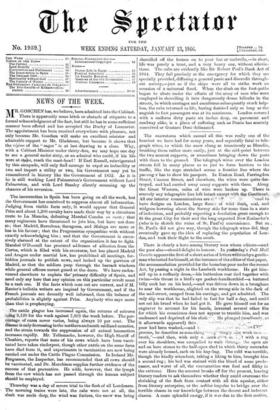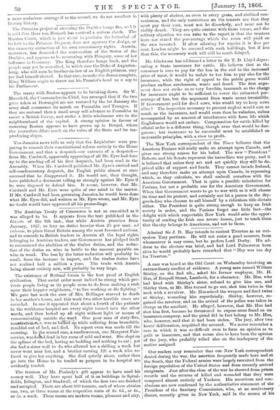There is clearly a hero among literary men whom editors—and
the poor also—should delight to honoui. In relleyclay's Pall Mall Gazette appears the first of a short series of letters wiittenbya gentle- man who tested forhimself, at the instance of the editor of that paper, the accommodation provided for the houseless poor under the recent Act, by passing a night in the Lambeth workhouse. He gOt him- self up in a ruffianly dress,—his buttonless coat tied together with twine—his throat in a bird's eye pocket-handkerchief—a battered billy cock hat on his head,—and was driven down in a brougham to near the workhouse, alighted on the wrong side in the dark of the mid-street, escaped from his carriage, and got admitted. The only slip was that he had failed to fast for half a day, and could not eat his bread when he had got it. He gave himself out for an engraver to account for his hands, invented several other fibs for which his conscience does not appear to trouble him, and was undressed and deprived of his cloth— He plunged (needlessly. as
it afterwards appeared) into -
poor had been washed,—and t rr process, he describes as something • weak rnut..,,.. broth,"—and then, with only a „heck aMrt ., I with a rug
over his shoulders, was compelled to walk throng:1 the open air and on bare stones to the half-open shed in which thirty comrades were already housed, each on his hay-bag. The cold was terrible, though the kindly attendant, taking a liking to him, brought him a second rug ; his bed was stained with the blood of some prede- cessor, and worst of all, the conversation was foul and filthy in the extreme. Here the account breaks off for the present, leaving literary readers to ask themselves whether they could overcome the shrinking of the flesh from contact with all this squalor, either from literary enterprise, or the nobler impulse to bridge over the terrible chasm in our knowledge between the decent and indecent classes. A more splendid energy, if it was due to the first motive, a more audacious courage if to the second, we do not recollect in literary history.































